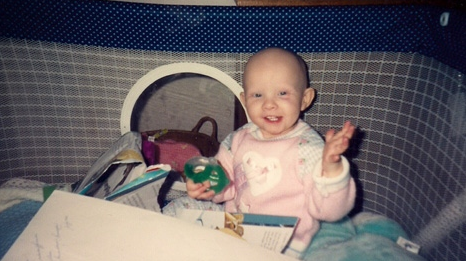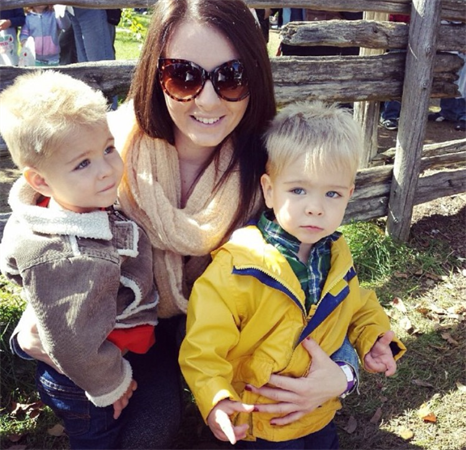Twenty-three-year old Taylor Date is a recent college graduate and mother of busy twin boys in the midst of renovating her first house in Milton, Ontario. She’s also a participant in Dr. Michael Taylor’s TFRI-funded study on childhood brain cancer.
Date was diagnosed with medulloblastoma, the most common childhood malignant brain tumour, when she was just nine months old. Her parents took her to numerous doctors after she stopped being able to walk and suffered from head pain, but physicians said nothing was wrong. Finally, one doctor noticed a soft spot on the baby’s head and sent her the hospital immediately.
“They did a CT scan and that’s when they found there was a tumour the size of a chestnut right by my brainstem,” says Date. “They sent me to SickKids, which is where I had the surgery that night. Without it, I would have died the next day because so much fluid had been building up in my head.”

Taylor as a baby, before her treatment for childhood brain cancer
The mortality rate for medulloblastoma is 30 to 40 per cent. Children that survive often experience negative side effects from surgery, radiation, and chemotherapy. Dr. Taylor’s research is focused on how this can be avoided for some children by a more personalized approach to treatment.
“Four different subtypes of medulloblastoma have been identified, and when we talk to parents of children with the very good types of medulloblastoma, many of them feel they would be willing to risk a slightly increased chance of a recurrence if they could have a large boost in [their child’s] IQ,” says Dr. Taylor, whose study MAGIC aims to personalize medicine for children with medulloblastoma.
“We’re now developing a clinical trial where the children will receive less therapy than they did in the past in an effort to minimize the damage done to the developing child. We want to keep the survival rates high, and have those children be as functional possible.”
Dr. Taylor’s groundbreaking research wasn’t available when Date had cancer in the early ‘90s, and her parents were left with a difficult choice. Doctors advised that radiation could leave the little girl “like a vegetable,” so they opted for chemo and surgery instead.
“They didn’t want to have me live like a vegetable,” says Date. “They thought ‘If chemo doesn’t work, we’ve lost hope’…I think it was probably just a gut feeling for them.”

Taylor and her twin sons
Their gut feeling was right: Date has been cancer-free ever since. She was followed up at SickKids extensively until the age of 18 – and her medical records are now being used in Dr. Taylor’s study.
Regardless of everything that happened, she adds, her story has a happy ending. Date has experienced no lasting side effects from her cancer treatment as a child and is able to live a normal life – something she hopes Dr. Taylor’s research will enable other children to have.
“I’m able to be a regular 23-year-old now,” says Date. “Based on how successful my story was, I hope that this research makes it successful for that many more people as well… Brain tumour research for children is just so important!”